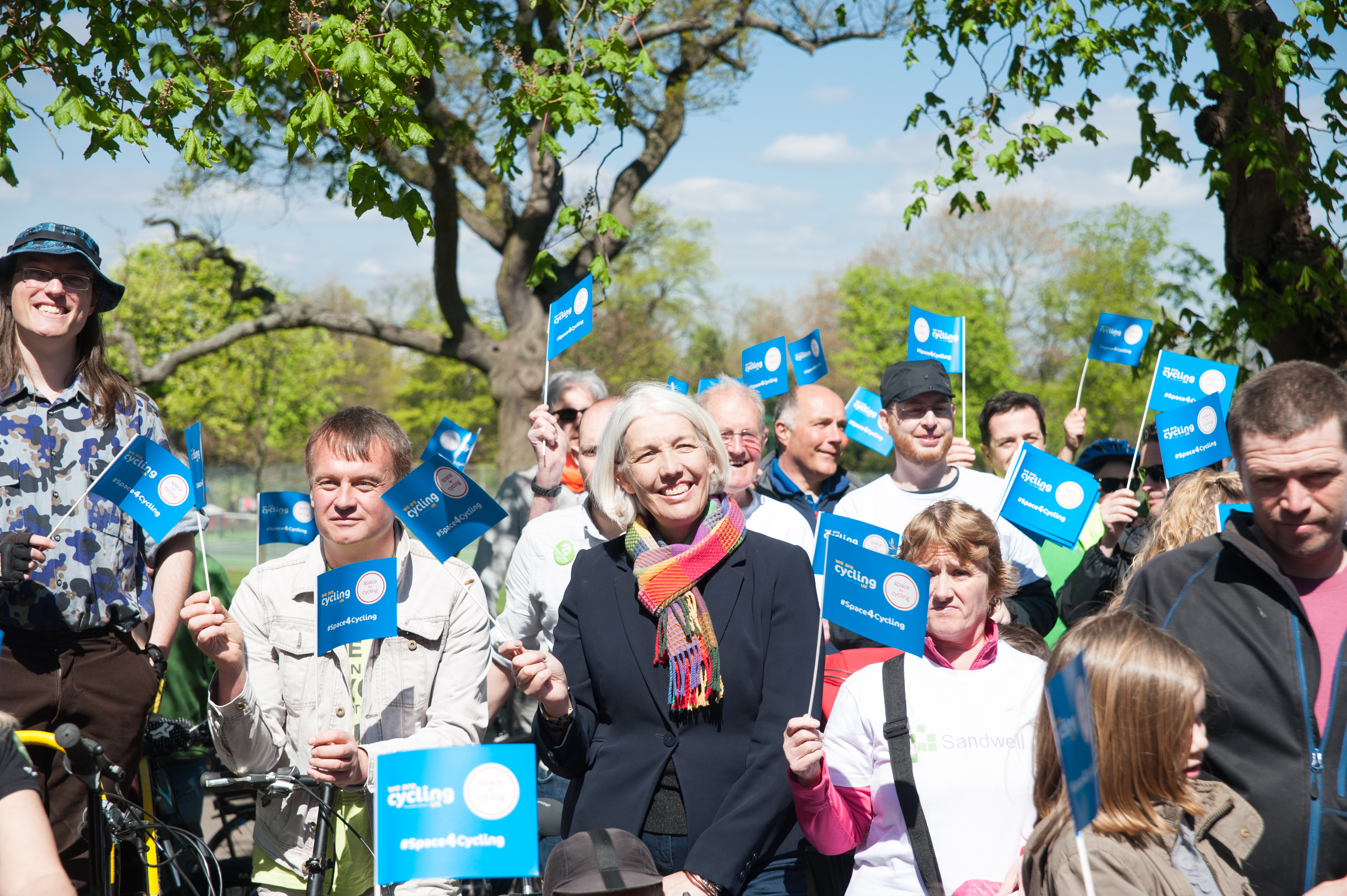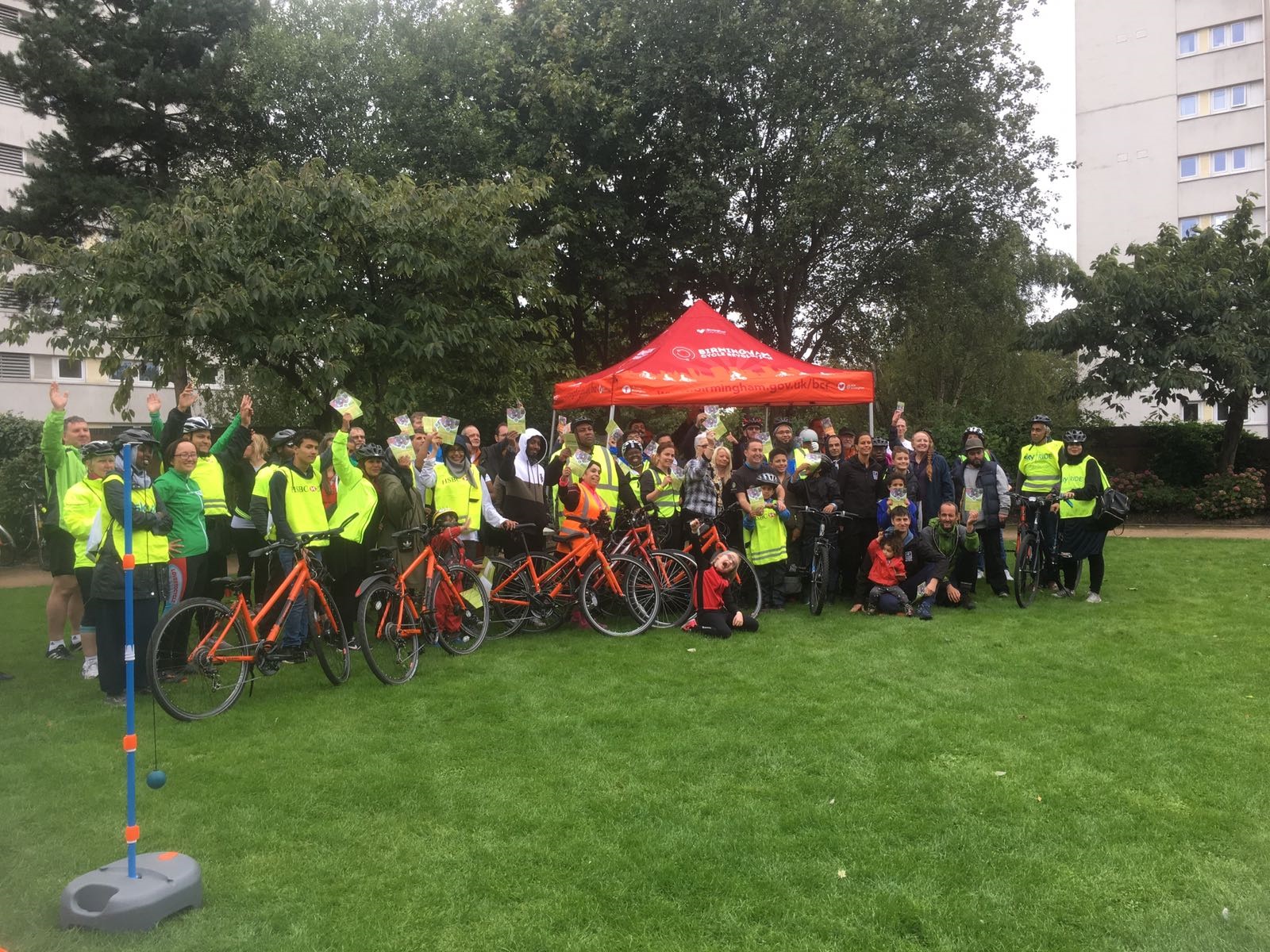Cycling provision is more than a proposition in Birmingham, it’s a matter of social justice
My cycling journey properly started when I became Birmingham City Council’s Cabinet Member for Transport and Environment in 2018. I wanted to have a big focus on promoting active travel – cycling and walking – as a healthier, greener alternative to private car.
The problem was, I had never been on a bike before. I was 37 years old. Practising what I preach has always been important to me, so I made the decision to finally learn how to cycle – in a very public way, via social media.
Supported by Big Birmingham Bikes, I went to Handsworth Park for my first ‘lesson’ and remember being so nervous. But once I’d got my balance and began riding, I really got a buzz out of it! Cycling around my local park, being surrounded by nature and fresh air…I quickly realised what I had been missing out on.
My health was also a significant driver. My level of fitness was low, I’ve been overweight all my adult life, and I was spending a lot of time behind a steering wheel. I was diagnosed with type 2 diabetes when I was just 25 years old.
My health story is, unfortunately, fairly typical for a South Asian male from an inner-city background. My ward of Lozells is my home; I grew up there, went to school there, and I still live there now with my family. It’s a place close to my heart, but there are undoubtedly major health challenges within it – not least that it has the lowest male life expectancy in our city.
I was recently a guest on the Streets Ahead podcast (you can listen to the episode here) where we discussed cycling not just being a proposition for leisure or commuting, but a solution to tackling health inequalities.
For me, the provision of better cycling infrastructure in all areas – including inner cities – and the provision of bikes for those who cannot afford them is a matter of social justice.
This is something I feel very strongly about.
It is key to unlocking solutions to tackle poor health, inequality, and indeed access to better opportunities. For our poorest communities, access to a bike means they can travel further than before; able to access education, jobs, and community services that they would have previously found much more difficult to reach.
Birmingham has been awarded funding from the Partnership for Healthy Cities (PHC) initiative supported by Bloomberg Philanthropies, with the World Health Organization (WHO) and Vital Strategies. This funding is being used to design and implement a dedicated communications campaigns to promote walking and cycling in 10 of the most deprived wards in Birmingham.
Currently, more than a quarter of journeys made by Brummies in private cars are less than one mile. Working to help people to make these short journeys by active travel will be a big step in improving our city’s health, as well as reducing air pollution and congestion – which we know is worse in areas of high deprivation.
For me, and I’m sure for many South Asian kids and families growing up, cycling was often associated with people from white, middle-class backgrounds
Waseem Zaffar, Labour councillor for Lozells ward, Birmingham
Covid-19 disproportionately affected those in areas of highest deprivation and inequality, including BAME communities, so this is where a lot of effort will be focused going forward.
If we’re going to encourage more cycling in these communities, there needs to be a cultural shift too. For me, and I’m sure for many South Asian kids and families growing up, cycling was often associated with people from white, middle-class backgrounds. In Lozells, it’s not unusual to have one household with three or four cars.
Dismantling this stigma and normalising cycling as a viable means of transport and exercise for all will be key to tackling poor health in these communities.
Community ambassadors are therefore incredibly important in helping us to make changes. There are some great things happening already in Birmingham. For example, the Sähëlï Hub works to support the needs of local Muslim women by delivering women-only cycling sessions.
In addition, the Nowka Bais CIC in Birmingham, which co-ordinates regular rowing activities and the annual Birmingham Dragon Boat Race, is looking at how they can encourage more Bangladeshi men and women to cycle for leisure and health reasons.
Birmingham Cycle Revolution has also been active in setting up several cycling hubs and clubs within local communities, which offer ‘Learn to Ride’ classes for kids and adults, led rides so you can cycle within a group, as well as the loan of bikes and equipment.
Bike loans and accessible opportunities are something we must continue to focus on if we want to encourage more people, particularly those from disadvantaged backgrounds, to participate in cycling.
I am proud to say that since 2015 Big Birmingham Bikes have provided 7,000 free bikes to local people. Their orange bikes are monitored in terms of usage and have clocked a staggering 200,000 miles in the first quarter of this year.
We also work closely with the good people at The Active Wellbeing Society (TAWS), Cycling UK and British Cycling to provide short-term bike loans to those who need them. Usually these bikes are loaned to those participating in Bikeability and Learn to Ride sessions, but with these activities on hold due to coronavirus, TAWS took the decision to loan their bikes to frontline workers.
All 82 of the TAWS bikes are currently out on loan to Birmingham’s key workers – including nurses, teachers and care workers.
This really shows that if you build it, they will come. I agree with those who say that the West Midlands as a whole hasn’t been strong enough on supporting cycling in recent years. The argument from some politicians has been that the appetite from the public to cycle just isn’t there.
However, this opinion is in stark contrast to the statistics. The 2017 Sustrans Bike Life survey found that 56% of Birmingham residents would like to start riding a bike, or could ride their bike more, and 79% support building more protected roadside cycle lanes, even when this could mean less space for other road traffic
What’s more, recent cycle counts have shown that more people have taken to two wheels during lockdown; for daily exercise; as a family activity; and to enjoy the spring sunshine. Some of the most popular routes have been canal towpaths and paths through parks, but people are also discovering the benefits of low traffic levels in their local streets.
Good cycling infrastructure will continue to be key to encouraging more cycling in Birmingham, particularly for people who are new to it – like I was two years ago.
It’s a big challenge of course, and politically it isn’t always going to be the most popular decision. But our nervousness as decision-makers in the past to support walking and cycling has resulted in us far too often choosing cars over people. This does nothing to improve the health of our citizens or the environment that surrounds us.
Our nervousness as decision-makers in the past to support walking and cycling has resulted in us far too often choosing cars over people
Councillor Waseem Zaffar
We have already implemented fully segregated routes on key corridors into the city centre, and miles of green routes and towpath improvements through the Birmingham Cycle Revolution. We have plans to extend the segregated routes (from A38 to Edgbaston Stadium and along the A34 to Perry Barr) and to provide more inclusive access for people of all cycling abilities, such as at Woodgate Valley Country Park.
The Covid-19 pandemic and resulting lockdown has seen more of us cycling and walking for pleasure, using the new routes and rediscovering the city. However, as we move out of lockdown there is an opportunity to harness this behavioural change and make it a permanent mode for Birmingham’s communities.
Public transport will continue to be at limited capacity due to social distancing so it seems to me that, as this virus continues to wreak havoc in our lives, we should take the chance to respond as positively as we can.
You may have already heard about Birmingham’s initial plans to deliver 14 schemes using the government’s Emergency Active Travel Funding in the next few weeks. They include:
- Temporary pop-up cycle lanes: on 7 priority cycle routes, including key connections into the city centre;
- Park and Pedal programme: to provide park and cycle options at rail station car parks and other suitable locations;
- Places for People programme: to create low traffic neighbourhoods across Birmingham, making walking and cycling safer for local journeys;
- Reallocation of road space and pavement widening: We have already done some temporary pavement widening measures in Erdington, Sutton Coldfield, Kings Heath, Harbourne and Ladypool Road to create space for walking and social distancing. We are now looking at similar measures in Stirchley and Moseley.
We are also bringing forward our City Centre Traffic Cells Initiative, with the aim of creating a less traffic-dominated environment and providing people wishing to travel to the city centre with safer alternatives to private car. This will include the introduction of some road closures and bus gates, banning some turning manoeuvres, and introducing contraflow cycling.
This is all part of a radical programme for change under the Draft Birmingham Transport Plan and subsequent Emergency Transport Plan. Further support has also been provided by Transport for West Midlands and its Roll & Stroll campaign – launched this week – which sets out ambitions for a "big summer of cycling and walking" across the West Midlands region.
Birmingham City Council’s overarching vision is to be a city in which all of our residents, including those from our most deprived communities, can lead healthy, safe and fulfilling lives. Providing access to cycling will help us to tackle the gross health inequalities we currently face and achieve that vision.
Strong statements in support of cycling have been made in recent weeks by both the prime minister and the secretary of state for transport. I’m motivated by their words and will continue to push for Birmingham’s citizens to be provided with better access and safer infrastructure to help improve quality of life.
I hope you’ll join me in that journey.





